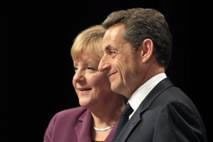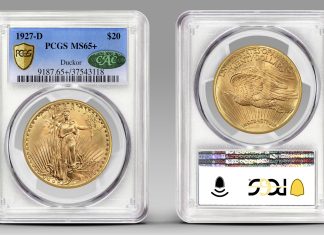 Wednesday’s 1.5 percent US dollar rally pushed commodities sharply lower and while gold initially resisted the trend, by the session’s end it too fell victim to the across-the-board selling of assets that intensified right along with the crisis in Europe. Overnight lows in gold came in at near the $1,750 mark whilst silver dropped fairly close to the $33 level.
Wednesday’s 1.5 percent US dollar rally pushed commodities sharply lower and while gold initially resisted the trend, by the session’s end it too fell victim to the across-the-board selling of assets that intensified right along with the crisis in Europe. Overnight lows in gold came in at near the $1,750 mark whilst silver dropped fairly close to the $33 level.
Gold and silver have shown what technicians at Elliott Wave have labeled a "double divergence" and one that underscores a possibly "fractured" market-one that is often an unhealthy one. The $1,600 and $32 levels for the two precious metals are the numbers to watch as they could usher in the start of their next ‘major down phase’ according to EW analysts.
Spot New York dealings opened at $1,770 with a feeble gain of $1.50 per ounce in gold and with a modest, 8-cent rise in silver (to $34.12 the ounce). Platinum opened flat at $1,626 while palladium lost $1 to start the session off at $645 per troy ounce. Rhodium was unchanged at $1,675 while copper fell 2.5% this morning. HSBC analysts have mentioned the word "oversold" in connection with the platinum-group metals’ complex.
Two hours into the Thursday session the selling intensified however, and gold fell some $10 under the $1,750 support level with a loss of nearly $30 per ounce. Silver dropped by 70 cents to once again draw close to the $33 mark. Crude oil advanced 1.75% while the Dow started to repair some of Wednesday’s damage with a 120-point climb out of the starting gate. Far better than anticipated jobless claims filings helped the equity index regain its footing.
US unemployment claims fell to a seven-month low and broke under the 400K mark with the latest report available from the Labor Department. Even the four-week average fell to its lowest level since mid-April of this year. However, while some 250K jobs would need to be created on a monthly basis in order to begin reducing the nation’s current 9% jobless rate in earnest, the pace of job creation is running closer to 80.000 monthly additions, revealing that America still has some distance to go on this all-important front.
Overseas equity markets lost hefty amounts of value overnight following the Dow’s near 400 point wipeout on Wednesday. But, everything has a lifespan (of various durations), it would appear. Changes in the European political structure (Greece) combined with Italy’s ability to sell some debt brought some positive changes to the markets this morning, along with a small dose of optimism (read: risk appetite). On the other hand equities as well as commodities remain hostage to the apprehensions surrounding the possible exit from the EU by one or another member or the aggravation of already recessionary conditions in the Old World economy.
Well, Greece has a new Prime Minister; a former ECB vice-president, no less. Mr. Lucas Papademos will now try his hand at righting the Athenian ship that still threatens to capsize and sink. Given his former ties, one would think that he might enjoy a modicum of better success with such efforts, but the jury is still out — conditioned by the nearly two-years-old drama that, when it first surfaced, appeared manageable.
Over in Italy, while Mr. Berlusconi has still not left on a permanent holiday despite having announced that which just days ago he said he would not consider doing, his government did manage to sell 5 billion euros’ worth of one-year T-bills this morning. Yields were close to 6% for these instruments while the ten-year ones remained well above the critical 7% mark. The relative success of the sale was seen as a passing of a critical test for Italy this morning. Mario Monti, the most likely successor to Mr. Berlusconi is waiting in the wings and will probably be tasked with that which Mr. B failed to pull off on his watch.
Albeit Italy is considered to be ‘too big to fail’ and Italy is not Greece by almost any metric other than debt-to-GDP, the idea that the ECB would break its most sacred ‘religious’ commandment and commence to print money in order to morph into a lender of last resort to the dominoes that keep toppling over in the Old World is considered as… heretical at this juncture. Many a hard money newsletter vendor has quickly jumped onto the "bandwagon" that declares that the ECB has no choice but to fire up the printing presses in order to fix the continental-sized debt mess.
The ECB’s Juergen Stark said last night his institution would de facto lose its independence if it were indeed to become the lender of last resort. He added that even if the ECB did crank up the aforementioned presses and dole out huge stacks of colorful bills, the strategy would not resolve various countries’ structural issues and it might prompt them to (continue to) act with very little in terms of fiscal restraint and/or responsibility.
"The disasters that we witnessed in the financial system must not repeat themselves" concluded Mr. Stark in a very Geithner-esque remark.
Related factoid number 79: Goldman Sachs has $2.32 billion of "funded" and $700 million of net funded credit exposure to the Italy while Morgan Stanley has $1.79 billion in similar exposure to the country.
At any rate, the latest messy developments in this crisis have engendered discussions among German and French officials about the very structure of the European Union. The LA Times reports that the idea of "radically overhauling" the EU and the possible setting up of a "more integrated and potentially smaller eurozone" has been not only floated, but likely discussed down to the finer details. Consider this statement from an EU official who wishes to (for now) remain anonymous:
"We need to move very cautiously, but the truth is that we need to establish exactly the list of those who don’t want to be part of the club and those who simply cannot be part [of it]."
 "Just The Two Of Us…We Can Make It If We Try…"
"Just The Two Of Us…We Can Make It If We Try…"
Clearly, this kind of thinking is closely linked to where things stand right now, and not only in Europe. They stand at the brink, actually. At least that is Ms. Christine Lagarde’s take on the matter at this juncture. The head of the IMF warned that "the global economy has entered a dangerous and uncertain phase."
She also cautioned that unless there is a concerted effort to tackle current issues, "we could enter a downward spiral of uncertainty, financial instability, and [attention commodity specs!] a collapse in global demand."
Some analysts already feel that the world is headed for the "lost decade" scenario that made an appearance in Ms. Lagarde’s speech in Beijing.
But, hey, fear not. We might not have to anxiously wring our collective hands for that long of a period. If all goes unwell, according to the somber minds over at something called "Exclusive Analysis" then the mother of all collapses awaits the world… like in two weeks’ time. The research firm claims that the odds of a banking crisis between November 23 and 26 are on the order of 65% at the present time. The "screenplay" being tendered by EA contains dramatic scenes last seen in that mega-disaster movie "2012" — including civil unrest in Spain, a government collapse in Portugal, and Greece leaving the EU to print the resurrected drachma and save itself.
And you thought only the Mayan calendar portended of a bad 2012…
Until tomorrow, sing that tune…
Jon Nadler
Senior Metals Analyst — Kitco Metals
Jon Nadler
Senior Analyst
Kitco Metals Inc.
North America
Disclaimer: The views expressed in this article are those of the author and may not reflect those of Kitco Metals Inc. The author has made every effort to ensure accuracy of information provided; however, neither Kitco Metals Inc. nor the author can guarantee such accuracy. This article is strictly for informational purposes only. It is not a solicitation to make any exchange in precious metal products, commodities, securities or other financial instruments. Kitco Metals Inc. and the author of this article do not accept culpability for losses and/ or damages arising from the use of this publication.
www.kitco.com and www.kitco.cn
Blog: http://www.kitco.com/ind/index.html#nadler










